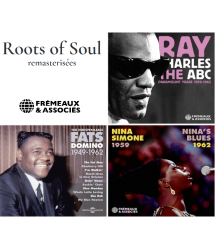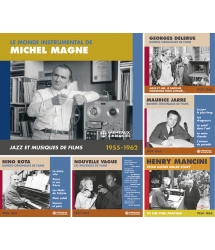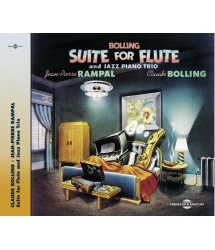Perhaps no one has so effortlessly and consistently crossed the line between jazz and classical music as French pianist-composer Claude Bolling. His first crossover hit was “Suite for Flute and Jazz Piano”, which he wrote for flutist Jean-Pierre Rampal. The record won Bolling a Grammy award and has sold nearly 2 million copies since its 1974 release. Last month it was reissued on Frémeaux/City Hall Records along with two other early Bolling collaborations with violinist Pinchas Zuckerman and guitarist Alexandre Lagoya. But Bolling is not content to rest on his considerable laurels. He also has three new releases this year. “First Class” is a pure jazz outing pairing Bolling’s 16-piece big band and legendary violinist Stephane Grappelli on great American standards. “The new thing with this is that Stephane had never played and recorded with a brass big band”, Bolling said. “He is the best jazz violinist of all time.” “Cross Over USA” reunites the pianist and Rampal for a collection of American standards based on place names, including “New York, New York”, “Chicago”, “Moonlight in Vermont” and “Way Down Yonder in New Orleans”. “These songs are difficult to arrange and adapt in the classical language, so it was a lot of work”, Bolling said in a phone interview from New York City, where he was promoting “Cross Over USA”. “Black, Brown & Beige” is Bolling’s version of the Duke Ellington suite first performed at Carnegie Hall in January 1943. Mercer Ellington, who took over leadership of the Ellington orchestra after his father died in 1974, has endorsed the Bolling tribute, saying, “Claude has done more than justice to this piece. He breathed life into it. He has assisted with my duty as the son of Duke Ellington to keep playing his music.” Bolling credited crossover artists who came before him for setting the standard. George Gershwin, Dave Brubeck, Peter Nero and John Lewis of the Modern Jazz-Quartet “made very beautiful combinations between the classical language and jazz. My way was different, but I was not the first”, he said. Bolling’s 1974 breakthrough recording began with a simple request from Rampal. “Jean-Pierre Rampal told me one day that he would like very much to have a jazz experience”, Bolling recalled. “He told me, ‘Write something classical for me and do some jazz behind and around it’. It was a challenge for me. “We did it just for the pleasure of the music. We never expected such a success.” The record remained on the Billboard charts for 530 weeks. Bolling, 63, said he was introduced to jazz through the recordings of Jelly Roll Morton, Fats Waller, Sidney Bechet, Louis Armstrong, Joe “King” Oliver, Coleman Hawkins and Benny Goodman. “That music attracted me because of its health, its humour, its power”, he said. “The jazz of today reflects the problems of today. That’s why it’s not so attractive to me.” Does Bolling have any future projects in mind? “Oh yes. I have enough for the rest of my life”, he said. “The next will be a strictly classical album with original compositions but no jazz in it.” Already recorded, it features a trio for harp, flute and cello; a trio for flute, clarinet and bassoon; a sonata for solo guitar; and a duet for alto saxophone and piano. Also in the works are another Claude Bolling Big Band recording and volume two of “Cross Over USA.”
Tom INECK - LINCOLN JOURNAL
Tom INECK - LINCOLN JOURNAL











